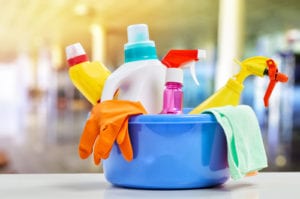According to the National Institute on Drug Abuse, inhalants are volatile substances that produce chemical vapors that can be inhaled to induce a psychoactive, or mind-altering, effect. Inhalants are difficult to categorize because they could be a variety of things. However, inhalants are typically described in terms of four categories:
Volatile solvents: These are liquids that vaporize at room temperature. These may include paint thinners or removers, dry-cleaning fluids, degreasers, gasoline, glues, correction fluids and felt-tip markers.
Aerosols: These are sprays that contain propellants and solvents. Examples of this would be spray paints, deodorant and hair spray, vegetable sprays generally used for cooking, and fabric protector sprays. The Palo Alto Medical Foundation (PAMF) notes that prolonged sniffing of aerosols could lead to damage such as heart failure and even death within minutes.
Gases: This could include medical gases or other medical anesthetics such as chloroform, halothane, and nitrous oxide, also known as “laughing gas”. Whipped cream dispensers often contain nitrous oxide, and other objects such as butane lighters, propane tanks and refrigerants contain gases that are inhaled.
Nitrites: Nitrites do not act directly on the central nervous system like the other categories do. They primarily act to dilate blood vessels and relax the muscles. Many people use this form of inhalant to enhance sexual encounters. Cyclohexyl nitrite, isoamyl nitrite, and isobutyl nitrite are common inhalants also known as “poppers” or “snappers”.
Users may inhale vapors directly from open containers, or may breathe in fumes from rags soaked in chemicals. Some people may spray the chemicals directly into their nose or mouth, or may inhale the fumes from a paper bag. Teenagers are especially at risk for this, as PAMF notes that inhalants are most common/popular between 7-9th grade students.
Common signs of inhalant abuse are: chemicals odors on clothing or in breaths, paint or stains on the face or clothing, hidden empty spray or solvent containers, drunk or disoriented appearance, slurred speech, nausea, lack of coordination and more. If you suspect that your teen is abusing inhalants, speak with them about seeking medical help. If you catch your child inhaling, take them to a clear, well ventilated area until the episode wears off and see a doctor. If your child is unconscious or not breathing, dial 911 immediately.
By being aware of inhalants, we can better protect our children from severe bodily damage. Speak with your children about the dangerous impacts of this today. You may just save your child’s life.
Hidden within the seclusion of a lush estate, the residential homes of Avalon Malibu sit, offering the privacy and premiere clinical treatment you want for your loved one. Our treatment programs offer both mental health and substance use disorder care. As one of California’s only primary certified treatment centers, our ability to provide holistic, personalized, co-occurring care is unparalleled. Call us today for information: 888-958-7511











